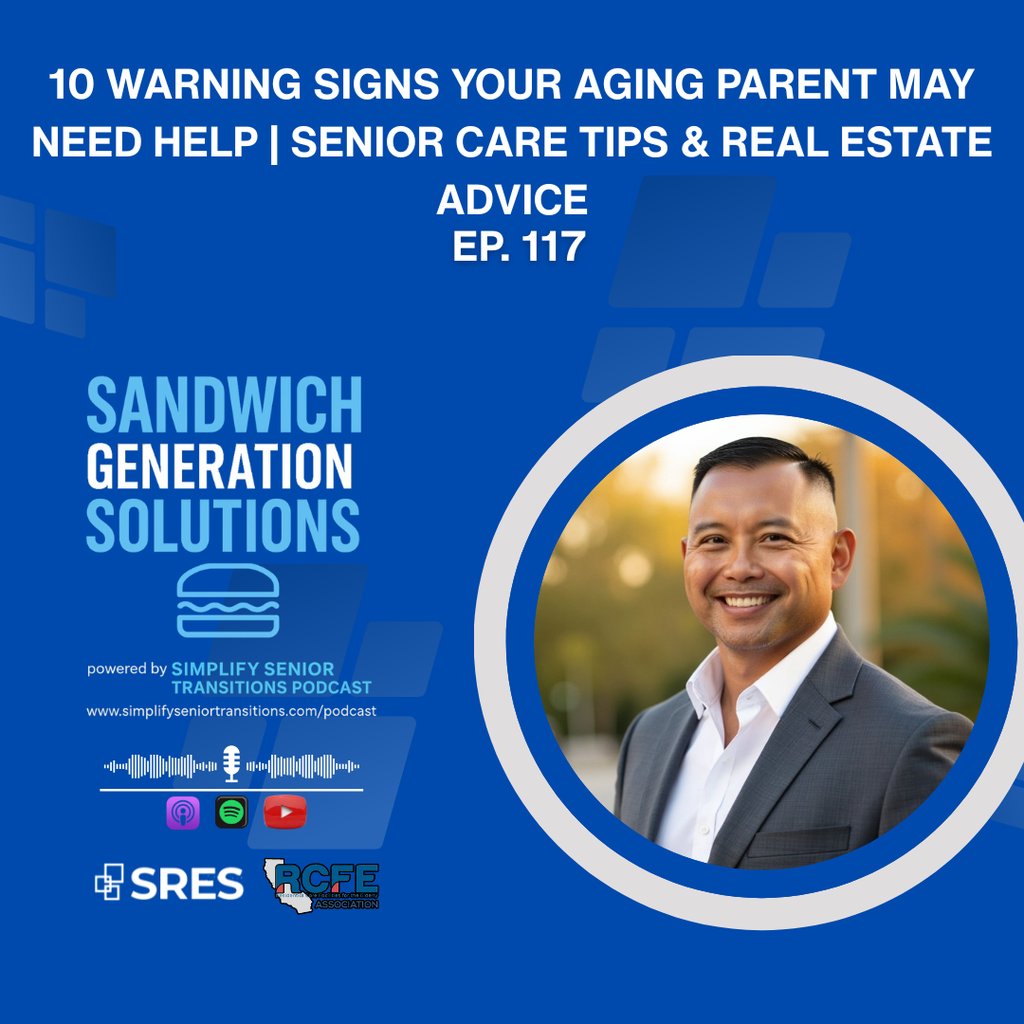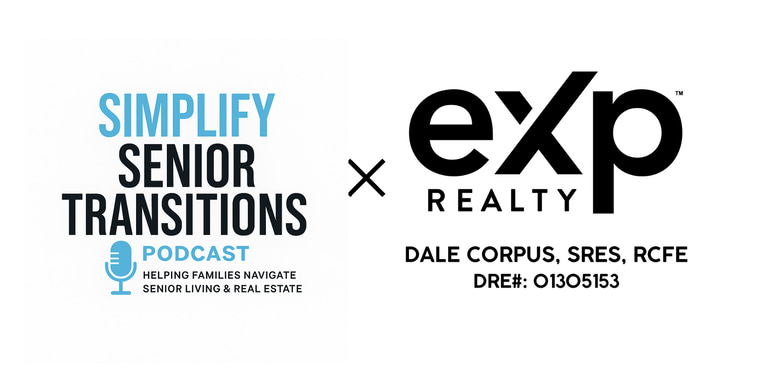10 Warning Signs Your Aging Parent Needs Help (Before a Crisis Hits)
A Practical Guide for Overwhelmed Bay Area Caregivers
Dale Corpus
11/12/20254 min read
Navigating the Fog: 10 Essential Warning Signs Your Aging Parent Needs Help
If you’re an adult child in the San Francisco Bay Area—whether you’re dealing with the traffic in Contra Costa, the tech pace of Santa Clara, or the specific real estate challenges in Alameda, San Mateo, San Francisco, Solano, or Napa counties—you know how overwhelming it is to care for an aging loved one. When daily life feels like a blur, recognizing when your parents need more support can feel impossible.
That’s why this week, Dale Corpus, your dedicated senior transition specialist and real estate expert, dove into a crucial topic: 10 warning signs that signal your aging parent may need help. Recognizing these signs early is key to maintaining their safety, health, and overall well-being.
Here’s what you’ll learn in this episode
This episode focuses on identifying crucial changes that indicate a need for intervention, whether that means implementing in-home care, addressing complex financial confusion, or beginning the transition to senior living. We explore concrete examples of common issues, from managing missed medications to preventing frequent falls, and discuss the immense weight of caregiver burnout. Dale emphasizes that he helps families navigate the full range of options, including downsizing, in-home care, and the sale of a senior's home.
The 10 Subtle Shifts to Watch For
The transition process often begins long before a major crisis. Here are the 10 key indicators Dale discussed, providing the crucial insight needed for overwhelmed families in the Bay Area:
Part 1: Health, Home, and Safety
Changes in Personal Hygiene:
If your parent neglects bathing, grooming, or wears the same clothes for days, it’s a red flag. This may be linked to mobility issues, depression, or memory loss. Dale shared an example of a family in Walnut Creek whose meticulous mother’s lack of grooming signaled deeper health concerns.
Unexplained Weight Loss:
Unintentional weight loss can signal difficulty cooking, forgetting to eat, or underlying health issues. A client in San Mateo, for instance, noticed significant weight loss in her father and found expired food, realizing he wasn't eating regularly. Malnutrition and a weakened immune system are serious risks here.
Missed Medications:
Scattered pills, skipped doses, or confusion about medication management is incredibly common and is one of the top reasons seniors end up in the hospital. A family in Alameda discovered their mother was missing doses and sometimes doubling up, leading to frequent ER visits.
Mobility Issues or Frequent Falls:
Watch for unexplained bruises or using furniture/walls for balance. A Napa family addressed this by installing grab bars and removing trip hazards after noticing their mother’s unexplained bruises. Preventing falls is essential for maintaining independence and avoiding long-term injury.
Household Disarray:
A once-tidy home now filled with clutter, spoiled food, or stacks of unopened mail suggests physical difficulty or cognitive decline. Dale cited a client in San Francisco who found his dad’s kitchen filled with spoiled food—clear signs he was overwhelmed.
Part 2: Cognitive, Financial, and Emotional Red Flags
Mood Changes or Isolation:
Becoming withdrawn, irritable, or disinterested in favorite activities is a potential sign of depression or cognitive decline. A social mother in Solano County, for example, suddenly stopped attending church and family gatherings, which was completely out of character. Isolation can accelerate cognitive decline.
Financial Confusion:
Missing payments, unusual spending habits, or repetitive purchases may suggest early dementia or being overwhelmed. In Santa Clara, a son discovered his dad was paying the same bill multiple times. Financial confusion puts seniors at high risk for fraud, debt, and loss of essential services.
Difficulty Driving or Getting Lost:
Getting lost on familiar roads is a serious warning sign. A daughter in Contra Costa County noticed her mom couldn't remember the route to the grocery store she had frequented for decades.
Memory Loss Impacting Daily Life:
Forgetting names, missing appointments, or repeatedly asking the same questions—as seen in a Napa father—indicates cognitive issues. Early evaluation is vital for planning support and maintaining quality of life.
The Emotional Weight of Transition
The tenth sign is perhaps the most critical for adult children managing this challenging process:
Caregiver Burnout:
If you or a family member feel utterly overwhelmed by caregiving duties, you need to ask for help. Burnout affects everyone’s well-being. A family in Solano County, realizing they were exhausted and couldn't provide the necessary care, sought help to transition their mother into the right senior living community.
When families identify these signs, they must face complex tasks: downsizing a lifetime of belongings, handling the emotional stress of transition, choosing the right care options (in-home versus community living), and potentially selling the senior’s home. Dale Corpus helps families navigate these very specific issues across all Bay Area counties. Getting help early ensures better care for your parents and provides essential peace of mind for your family.
You’re Not Alone — Next Steps
If any of these signs sound familiar, you are not alone.
If you're ready to explore options for in-home care, downsizing, or moving into senior living, Dale offers expertise in simplifying these complex processes.
✨ Schedule a FREE consultation: www.simplifyseniortransitions.com
✨ Follow Dale on Instagram: @soldbydale
✨ Listen to the full podcast episode for deeper insights
P.S. Got news or an amazing story to share?
Email: dale.corpus@exprealty.com — you may be featured in our next episode!
Watch The Podcast Here



Transitions Made Simple
Helping seniors transition with ease and peace.
📍 Serving the San Francisco Bay Area
📞 GET IN TOUCH
📬 STAY INFORMED
Dale Corpus, SRES, RCFE
📱 925-380-1657
📧 dale@simplifyseniortransitions.com
🕓 Available for free 15 min consultations by appointment
© 2026. All rights reserved.
Sign up for monthly senior transition tips & real estate insights.
